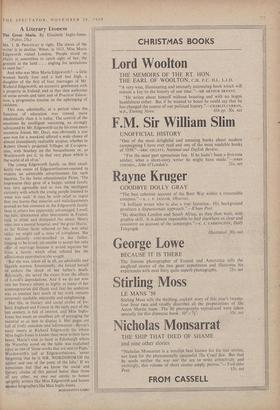A Literary Lioness
The Great Maria. By Elisabeth Inglis-Jones. (Faber, 25s.)
MR. J. B. PRIESTLEY is right. The status of the writer is in decline. When, in 1813, Miss Maria Edgeworth visited London, People stood on chairs at assemblies to catch, sight of her, the greatest in the land . . . angling for invitations to meet her.'
And who was Miss Maria Edgeworth?—a little woman barely four and a half feet high, a daughter of the first of four marriages of Mr.
Richard Edgeworth, an eccentric gentleman with a property in Ireland, and at that date authoress of some novels and tales and of Practical Educa- tion, a progressive treatise on the upbringing of children.
This was, admittedly, at a period when they function of education was viewed more idealistically than it is today. The control of the emotions by intelligent reasoning, so strongly advocated by Mr. Edgeworth (as by his even more
eccentric friend, Mr. Day), was obviously a sine qua non for a mankind offered a wide choice of almost immediately realisable utopias, whether in
Robert Owen's projected Villages of Co-opera- tion, with Southey on the Susquehanna or, as Wordsworth put it, 'in that very place which is the world of all of us.'
The young Edgeworth family on their excel- lently run estate of Edgeworthstown.seemed to visitors an admirable advertisement for such theories. To the Swiss educationalist Pictet, 'The impression they gave of a happy, united family was very agreeable and so was the intelligent curiosity with which the young people listened to what was said.' It may be with relief or regret that one learns that miseries and maladjustments proved no less common in the Edgeworth family than in others less apparently advantaged. Lovell, the heir, disoriented after internment in France, took to drink and dissipated the estate; Henry went into a mental hospital; and 'the great Maria,' as Sir Walter Scott referred to her, was what today we might call a mass of complexes. She was jealously over-attached to her father,
longing to be toyed, yet unable to accept her only offer of marriage because it would separate her from a family which often refused her the affectionate approbation she sought.
But she was, taken all in all, an admirable and likeable woman. Emotionally, she forced herself to endure the shock of her father's death. Practically, she saved the estate from the effects of Lovell's depredations. And if we do not now rate her literary talents as highly as many of her contemporaries did (Scott said that his ambition was to emulate her) much of her work remains extremely readable, enjoyable and enlightening.
Her life, in literary and social circles of Ire- land, England and France in the early part of the last century, is full of interest, and Miss Inglis- Jones has made an excellent job of arranging the material so as best to display it. Her pages are full of lively anecdote and information—Byron's nasty sneers at Richard Edgeworth (to whom Miss Inglis-Jones is kinder than most writers have been), Maria's visit to Scott in Edinburgh where the Waverley novel on the table was explained away as one of 'those works that are sent to Papa,' Wordsworth's call at Edgeworthstown, 'never forgetting that he is MR. WORDSWORTH the author and one of the poets of the lake.' If we sometimes feel that we know the social and literary circles of this period better than those of any other, we owe our entrée to honest sprightly writers like Miss Edgeworth and honest modest biographers like Miss Inglis-Jones.
MARGFIANITA LASK I






































































 Previous page
Previous page